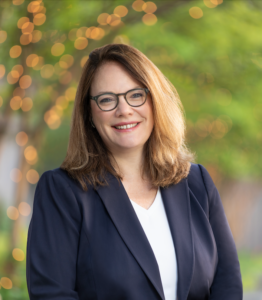As Category 4 winds battered New Orleans approximately 300 people huddled in the confines of The New Orleans Marriott hotel just steps from the historic French Quarter. The accommodations were modest — cots set up on the facility’s ballroom floor became a safe haven from the danger of flying glass shards from broken windows.
The tenor was a far cry from the buzzing activity of what was intended to be the Community Action Partnership’s (CAP) annual convention. Three of the CAP staff, one member of its board and some of its delegates were among those waiting out the storm.
“We were getting updates from the hotel staff and some people had the small, transistor-like radios,” recounted Brian Peterkin-Vertanesian, J.D., vice president for programs, and grants management, one of CAPs staff holed up at the Marriott.
“Things were mostly calm, although people did get a little more worried when we heard what was going on with the problems at the Superdome. You could tell that people were a little nervous but most were resigned to being there for a couple of days.”
New Orleans was a top convention city, with numerous charities and associations having to cancel or move their biggest revenue generator of the year.
Located near the Mississippi River, the area immediate to the Marriott was spared the deep flood water resulting from the broken levees on the 17th Street Canal in the western part of the city and the Industrial Canal on the east side.
Once the brunt of the storm had passed, Marriott allowed its guests to use the one functioning elevator to retrieve personal items from their rooms. When Peterkin-Vertanesian was able to look outside to assess the damage, he reported seeing blown out windows and flood water that had halted approximately a block away from the hotel.
During his time in the Marriott ballroom Peterkin-Vertanesian befriended a woman and her son, who worked at the Marriott. It was through that relationship that he was able to hop a 1 a.m. ride out of town after the storm had passed. Other than a strong police presence blocking off impassable roadways, Peterkin-Vertanesian described the departing trip as “not much of a problem.”
The magnitude of the disaster didn’t fully hit him until he arrived back in Washington, D.C. “I usually don’t tend to watch a tremendous amount of television coverage of these events — with the tsunami and 9/11, I wasn’t tuned in 24/7 like a lot of people,” he explained. “But I took a few days off and watched it with my wife. I’ve been to New Orleans many times, I love jazz, and this was just totally devastating.”
The force of nature put the immediate brakes on CAP’s annual convention, scheduled for August 30-September 2, its largest gathering with an attendance of 1,400-1,600 strong. The organization made the final decision to cancel the event on Sunday afternoon, August 28, when it became apparent that airlines had cancelled service to the city. That day CAP leadership also learned that the New Orleans Marriott was no longer registering guests and management of the hotel had fled the city, explained Derrick Span, national president of CAP.
Despite a continued desire to reschedule the convention in New Orleans, prospects are tenuous at best. “Our board unanimously voted to reschedule the convention in January in New Orleans,” Span said. “We move our convention around every year and the community action agencies of New Orleans had bid on the conference and received it, spent a year planning it and they lost the convention through no fault of their own. It’s only right for us to return contingent upon the infrastructure of the city, obviously. We also though we should go back because we felt the community would need that revenue. We want to contribute in some way to the economy there … but it appears, as the images and reports keep coming out of New Orleans, that those hopes might be dashed as well.”
The window for rescheduling the event is restricted, as CAP does not want to crowd its scheduled 2006 convention, which is, ironically enough, slated for Orlando during hurricane season. The organization’s convention committee will most likely consider how weather impacts certain event locations in the future, Span admitted. CAP books its conventions a number of years in advance and attempts to visit all of its 10 regions. With Orlando being the last in the region impacted by hurricanes, CAP will begin to move its conventions more north and west.
More immediate plans include a meeting with the finance committee and the board to discuss the economic impact of the cancellation of the convention. “We do know that the impact will be huge, as with everyone who had a convention there,” Span said. “But the impact on us is a lot less severe than that of the citizens of New Orleans and the whole Gulf region. We lost a convention but they lost communities.”
Three’s not the charm
The National Catholic Development Conference (NCDC) appears to be snake bitten when it comes to its recent conferences. In 2001, it had an event cancelled due to the September 11 terrorist attacks. Last year its conference went on as scheduled in Orlando but smack in the middle of the Charlie, Ivan, Jeanne and Frances hurricane rush. Now, its 37 th NCDC Annual Conference and Exposition scheduled for October 2-5 at the New Orleans Marriott has been shelved.
NCDC worked with the Marriott International offices to find a suitable alternative location for its conference, explained Ryan Gates Gold, communications and public relations associate at the NCDC. The nonprofit signed a contract to hold its event in St. Louis during the same days of October 2-5.
Gates Gold added that it wasn’t terribly difficult to find alternative locations to house its 600-person conference since the travel industry has been supportive as a result of the far-reaching destruction wrought by Katrina. The organization is keeping contact lines open with its preferred airline provider American Airlines to iron out the details of ticket exchanges for St. Louis.
“Our attendees have been very understanding,” Gates Gold said. “We have members in New Orleans, Alabama and Mississippi and we hope everything works out in all of those states. It’s just as important for us, after the storm, to try and get things back to normal.”
Some semblance of normalcy is made easier for the nonprofits that can reschedule events on the same dates it had originally booked for New Orleans. APICS — The Association for Operations Management, was able to push its New Orleans international conference to Kansas City while procuring the same dates of October 16-18.
Once Katrina hit, APICS’s meetings staff started immediately on the logistics of a move to another city by working with the Kansas City Convention and Visitors Bureau. As a result, the educational program, the featured and general session speakers, and exhibitors will not have their schedules interrupted — it will just be a matter of changing transportation. The association received positive feedback from its membership. According to Karen Wynn Freeman, CAE, deputy executive director, the first question was, “Where are we going to have the conference?” The question was not, “Is APICS canceling?”
Within four days of the hurricane hitting New Orleans, APICS was able to secure the site and notify its approximately 3,500 speakers, exhibitors, and registrants. It continues to post information on its Web site and utilizes electronic mailing lists to send out information.
In the end, the shift just may prove to be a silver lining for the organization.
“Kansas City is a good place for us because demographically it is a great fit for our audience,” Wynn Freeman said. “The Midwest is a major manufacturing area, and many of our members are well situated to drive to Kansas City. Omaha, Des Moines, and Wichita are three hours away; St. Louis is four. Minneapolis, Chicago, and Oklahoma City are approximately six hours. And Kansas City is equidistant from the coasts. So in some ways, because it is geographically well-situated, perhaps it is fortuitous for us to have this opportunity.”
Flexibility is the key to allowing other organizations to alter conference plans. With over 6,000 attendees, 300 exhibitors and 200 companies, the Association for Career and Technical Education (ACTE) is looking for a venue to house its conference, originally scheduled for December 8-10 at the New Orleans Convention Center.
“We’re considered more of a mid-sized convention so it does open us up to what is called “second-tier” cities,” explained Peter Magnuson, senior director of programs and education at ACTE. “We don’t have to go to Chicago, New York or Los Angeles. We can do it in Louisville or Nashville. But because it is in December, we have to consider weather issues.”
Thus far, ACTE has yet to receive a cancellation although Magnuson said that may be attributed to the fact that attendees and exhibitors are still in a wait -and-see mode. With contacts out to more than a dozen cities the organization has plenty of time to select a location and pull off a good show, Magnuson added.
What do you do with 6,000 pre-registrants and nowhere to go – at least during November 5-9? You go to the City of Brotherly Love, even if the love you’re feeling means pushing your convention back to December 10-14.
“Our meeting is very space-intensive and there are only so many cities that can handle it,” explained David Fouse, director of communications at the Washington, D.C.-based American Public Health Association (APHA). “Ideally, we would’ve kept the same dates but no location with the space we need had those dates available.”
APHA has released detailed information regarding the change in venue. Those who have registered for the annual meeting in New Orleans will have their registrations automatically transferred and applicable for the Philadelphia event. APHA staff is negotiating contracts for space and discounted hotel rates with the Philadelphia Convention & Visitors Bureau and Philadelphia hotels. The organization has also contacted American Airlines and Continental Airlines, the official airlines for its annual meeting, and has requested that the providers allow penalty-free changes to existing New Orleans airline reservations. It is awaiting the companies’ response.
All hotel reservations and deposits previously made for New Orleans will be automatically transferred to comparable hotel properties in Philadelphia. This is made possible by scheduling the Philadelphia meeting within the same Saturday through Wednesday block as was planned in New Orleans. So, if an attendee made a hotel reservation in New Orleans to arrive on Saturday and depart on Wednesday, their transferred reservation in December in Philadelphia will have them arriving on Saturday and departing on Wednesday.
The Public Health Expo layout and exhibitor re-assignments had to be worked out but choosing Philadelphia as the new Host City did have its benefits.
“We usually make arrangements with cities seven to eight years in advance and here we are looking to relocate this event in three months time,” Fouse said. “The fact that we were in Philadelphia three years ago allows us to build off of work that was previously done for instance, signage, locations and assignments.”
APHA is doing its part to help out its original meeting partners as well. The Annual Meeting child-care provider, official photographer, florist and security vendor, all based in New Orleans, have been confirmed to travel to the relocated event in Philadelphia.
America’s Second Harvest is supporting New Orleans by canceling its annual conference, which was to be held some 1,500 miles away in Vail, Colo. The Vail Marriott agreed to drop the event without assessing any fees for the nonprofit.
“We cancelled our annual conference because our focus is on the hurricane relief efforts,” explained Ross Fraser, media relations manager at America’s Second Harvest. “We have people from our national office as well as our food banks – I think 30 people in all – down in the area affected by the hurricane. They’re helping to procure and move food. The New Orleans food bank is inaccessible, it’s less destroyed than surrounded by water. They’ve had to set up a new food bank out of town. It’s been an enormous undertaking to secure a new location for that food bank.”
The cancellation marks the end of the only conference during the year that representatives from all of the Chicago-based nonprofit’s food banks attend.











